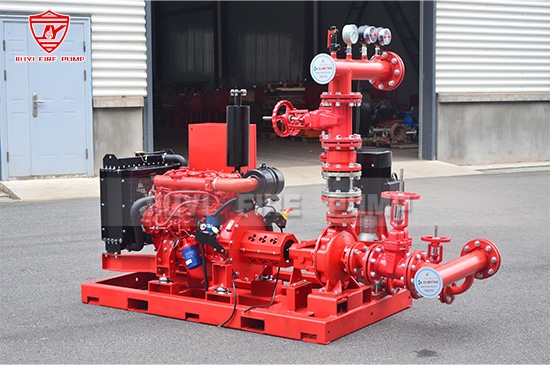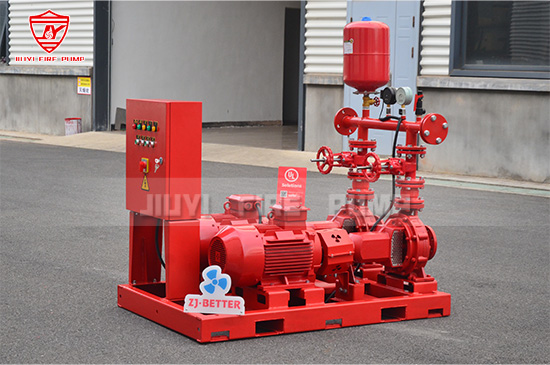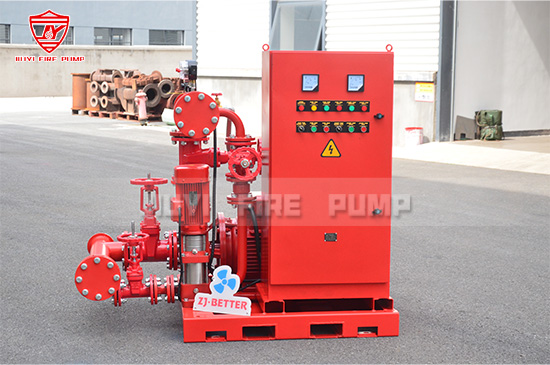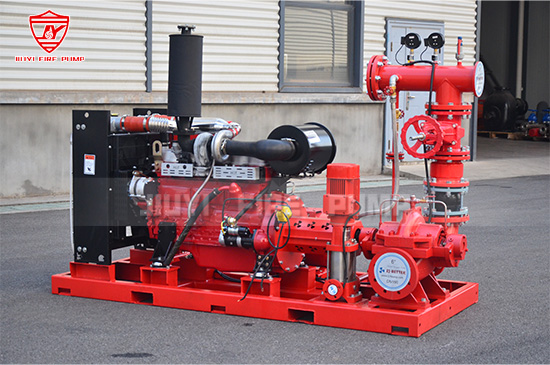Fire pumps are one of the most essential components of any fire protection system, providing water pressure to extinguish fires quickly and effectively. A failure in this system can have devastating consequences, potentially jeopardizing lives, property, and infrastructure. Understanding what happens when a fire pump fails, the causes of failure, and the steps to take to avoid such issues is critical for anyone responsible for fire safety.
Fire pumps are crucial for maintaining the necessary water pressure in fire sprinkler systems, standpipe systems, and other fire protection systems. They are typically powered by either an electric motor or a diesel engine, depending on the design of the fire protection system. These pumps ensure that water flows at the right pressure to extinguish fires before they spread.
When a fire pump operates correctly, it acts as a lifesaver during an emergency, supplying an uninterrupted flow of water to keep the fire under control. However, when these pumps fail, the consequences can be dire.

The most immediate and obvious consequence of fire pump failure is the inability to provide the necessary water pressure to extinguish a fire. Without water, fire suppression systems—whether sprinklers or standpipes—become ineffective. This delay can result in the rapid spread of fire, leading to significant damage to buildings, equipment, and assets. In the worst-case scenario, it can lead to loss of life.
A malfunctioning fire pump can lead to the failure of the entire fire protection system, including alarms and sprinklers. A complete system shutdown can leave a building or facility vulnerable to fire. This is particularly dangerous in high-risk environments like industrial sites, data centers, or hospitals, where fire protection is critical to safety.
Fire pump failure can lead to extended response times, allowing fire to cause more damage to the structure and contents of the building. In high-rise buildings or complexes with large-scale operations, a fire pump failure could result in millions of dollars in property loss, as well as long-term operational disruption.
When a fire pump fails, it can be classified as negligence on the part of the property owner or operator. This may lead to higher insurance premiums or, in some cases, the inability to get insurance coverage. Furthermore, the cost of repairs and potential legal liabilities from the failure can add to the financial burden.
Understanding the causes of fire pump failure is vital in preventing it. Several factors can contribute to a pump malfunction, including mechanical, electrical, and environmental issues.

Mechanical problems, such as worn-out seals, bearings, and shafts, are some of the most common causes of fire pump failure. These parts are subject to high levels of stress and wear, and if they are not properly maintained, they can fail during an emergency. Regular maintenance is crucial to keep these components in working order.
If the fire pump is powered by an electric motor, electrical failures can occur due to power surges, damaged wiring, or faulty circuit breakers. The failure of the electric supply can cause the pump to stop running, leaving the system vulnerable. In the case of diesel-powered fire pumps, electrical problems in the fuel system or ignition system may prevent the engine from starting.
One of the primary causes of fire pump failure is the lack of regular inspection and maintenance. Pumps need to be periodically tested to ensure they can operate effectively when needed. A failure to do so may result in issues such as air leaks, low water pressure, or mechanical breakdowns that can affect the pump’s functionality.
Fire pumps rely on an adequate water supply to function. Any problems with the water source, such as contamination, blockage, or low water levels, can impair the pump’s ability to operate effectively. Additionally, if the water tank or reservoir is not properly maintained or inspected, it can lead to water quality issues that affect the pump's performance.
Corrosion is another common issue, particularly in industrial settings where fire pumps are exposed to harsh conditions. Saltwater, extreme temperatures, and exposure to chemicals can cause significant damage to both the pump and its components. Proper installation in a suitable environment can help mitigate this risk.

Preventing fire pump failure requires a combination of proactive measures, including proper installation, regular testing, and maintenance.
Regular testing and maintenance of fire pumps are essential to identify potential issues before they result in failure. Industry standards, such as those set by the National Fire Protection Association (NFPA), recommend monthly testing, annual inspections, and periodic maintenance by trained professionals. This ensures that fire pumps are operating at peak efficiency when required.
When parts like seals, bearings, or impellers show signs of wear, they should be replaced immediately to prevent breakdowns during emergencies. Preventative replacements and upgrades can extend the life of the pump and improve its reliability.
To ensure that fire pumps continue to operate during power outages, backup power systems like generators or uninterruptible power supplies (UPS) should be installed. Diesel-powered fire pumps generally have less reliance on the grid and can be more reliable in emergencies, though electrical pumps may need a backup generator.
Fire pumps depend on a constant and clean water supply to function. Ensure that the water tanks or reservoirs are regularly cleaned and inspected for debris, corrosion, or other issues that might impede water flow. It’s also crucial to ensure that there is a reliable backup water source available in the event of a supply disruption.
Training staff on fire safety systems, including fire pump operation, can prevent operational mistakes that might lead to failure. Having a plan for responding to fire pump failures and ensuring all personnel are familiar with fire safety protocols can help mitigate the risks when things go wrong.
Proper installation of fire pumps according to industry standards is essential to ensure their functionality. Whether the pump is electric or diesel-powered, having it installed by certified professionals ensures that it is correctly integrated into the overall fire protection system, reducing the chances of failure due to improper installation.
If a fire pump fails during an emergency, it’s crucial to act quickly. Having a contingency plan in place can help mitigate the damage. First, ensure that backup fire suppression systems, such as portable fire extinguishers or secondary pumps, are ready for use. Then, notify emergency services and the appropriate personnel immediately to address the failure.

Fire pump failure can have catastrophic consequences, from loss of life and property to increased insurance premiums and legal liabilities. Understanding the causes of failure, taking proactive steps to prevent it, and implementing contingency plans for emergencies are critical for maintaining effective fire protection. Regular maintenance, training, and monitoring are the best ways to ensure that fire pumps function correctly when they are needed most. With the right approach, fire pump failure can be avoided, and the safety of individuals, property, and assets can be guaranteed.